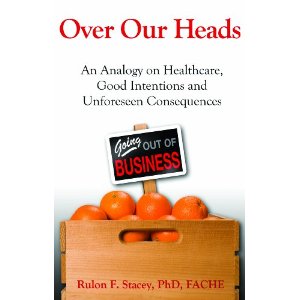 Dr. Rulon Stacey, PhD is the president and CEO of Poudre Valley Health System, he is the current president of the American College of Health Care Executives, and recently won the Malcolm Baldrige Award presented by President Obama. He recently published a new book: Over Our Heads: An Analogy on Healthcare, Good Intentions and Unforeseen Consequences, which outlines some of the problems with health care in our country. In the book he uses an allegory of a grocery store owner to explain how government regulation has created a cumbersome and expensive health care system that is near the brink of failure. He cites specific government bills and describes how each of them has affected the health care system. The allegory allows the layperson to understand some of the difficult nuances of health care and government regulation. I think this is an extremely important book written by a man who knows the system as well as anyone else. I recommend the short read to all medical students and everyone else. Below is the official book description from Amazon.
Dr. Rulon Stacey, PhD is the president and CEO of Poudre Valley Health System, he is the current president of the American College of Health Care Executives, and recently won the Malcolm Baldrige Award presented by President Obama. He recently published a new book: Over Our Heads: An Analogy on Healthcare, Good Intentions and Unforeseen Consequences, which outlines some of the problems with health care in our country. In the book he uses an allegory of a grocery store owner to explain how government regulation has created a cumbersome and expensive health care system that is near the brink of failure. He cites specific government bills and describes how each of them has affected the health care system. The allegory allows the layperson to understand some of the difficult nuances of health care and government regulation. I think this is an extremely important book written by a man who knows the system as well as anyone else. I recommend the short read to all medical students and everyone else. Below is the official book description from Amazon.
Costs continue to soar, and Americans already crippled by a sluggish economy struggle to pay escalating insurance premiums. Politicians, entertainers, and other public figures regularly demonize healthcare professionals as the ones who created this situation through either greed or mismanagement. Meanwhile, it seems as though government solutions just make things worse, and the problems keep piling up.
How did we get to this point? According to Rulon Stacey author of Over Our Heads: An Analogy on Healthcare, Good Intentions and Unforeseen Consequences the roots of the problem are inseparable from the solution. Government intervention, meant to make healthcare more accessible and affordable, has instead created a system so convoluted and complex that we can no longer keep up with current policy.
This book is Stacey's attempt to describe, in a concise and relatable way, where our national healthcare policy went wrong. His analogy centers on a grocery store in the fictional town of Capital Springs and details what happens when the city government decides to issue food vouchers in order to help the community s poor and then gradually begins to reduce their reimbursement.
As the mayor tinkers with the program, the results of his actions lead to higher prices, inadequate distribution, and a situation analogous to where healthcare finds itself right now. The book ends with the election of an even more generous mayor and a grim prediction of what will happen to the industry if current public policy remains unchanged.
Readers will learn three key lessons:
1. Government intervention, fueled by good intentions, caused this crisis.
2. Current public policy is based on faulty information and should be evaluated.
3. If left unchecked, health reform will continue to promise more healthcare for less reimbursement…and the whole system will surely collapse on itself.This book will be welcomed by healthcare professionals searching for a way to tell their story, political reformers building a case for change, students seeking a defined case study on the healthcare cost crisis, and citizens seeking insights on how we got so far in over our heads and where we re likely to end up.





 My name is Andrew and I am a first year resident training to be an ophthalmologist. I created ShortWhiteCoats to provide medical students, residents, and the public with all the information I spent so many hours looking for during medical school.
My name is Andrew and I am a first year resident training to be an ophthalmologist. I created ShortWhiteCoats to provide medical students, residents, and the public with all the information I spent so many hours looking for during medical school.








1 comment
Charcia
February 13, 2016 at 2:02 pm (UTC -4) Link to this comment
Thanks for promoting Grand Rounds this week. We hope you ejyenod it. We loved your recent post about the 10 most important people in health care. (We actually posted it on our Facebook page too!)Julie Rosen